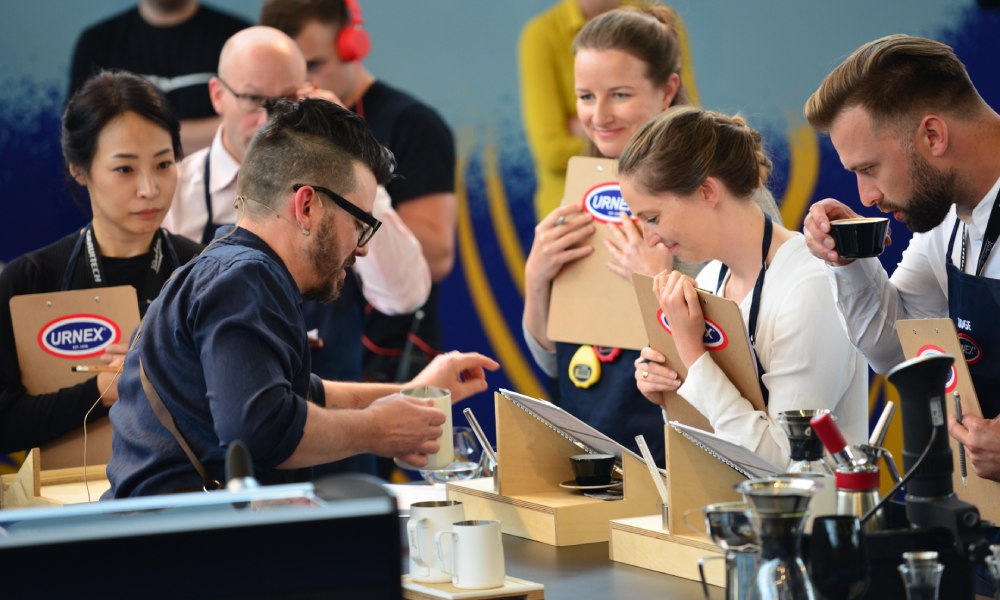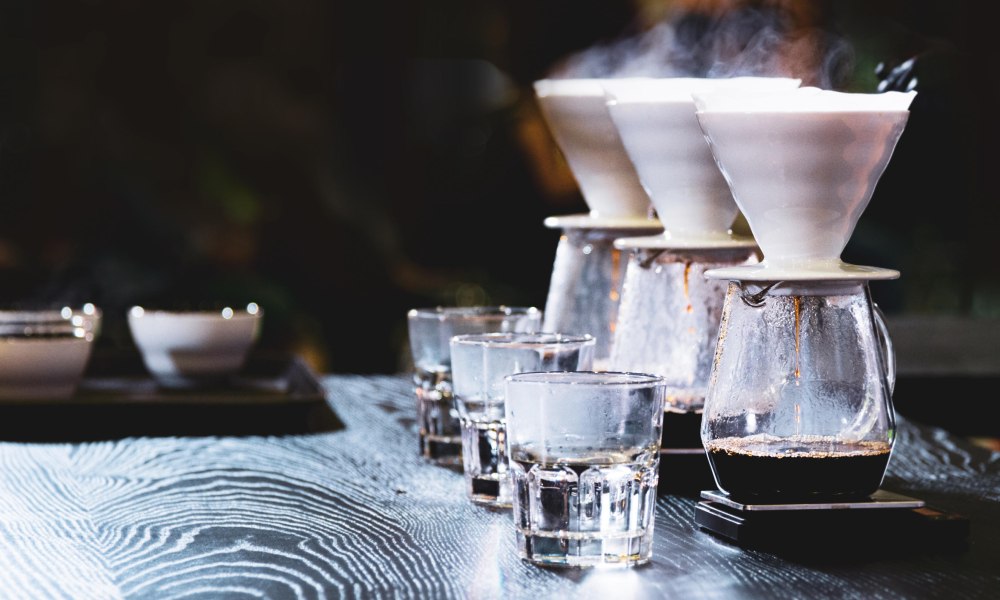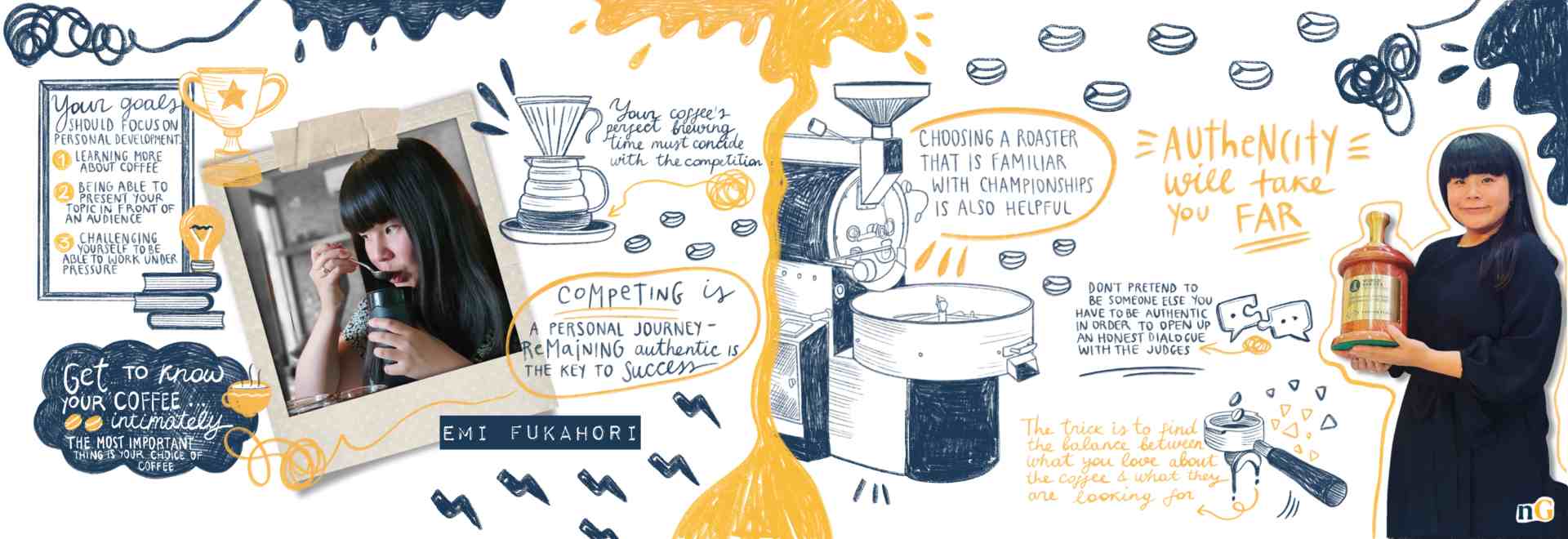Competing is a personal journey – staying authentic is the key to success
World Brewers Cup Champion 2018, Emi Fukahori, offers her advice on how to approach coffee competitions and how to keep a cool head in front of the judges.
Competing is one of the best ways to grow as a coffee professional and as an individual. But growth comes with putting yourself outside of your comfort zone – and that’s exactly what competitions do.
Since they started, we have witnessed skilful baristas take to the stage showcasing innovations within specialty coffee. Only one person can win first place, but this is only in terms of ranking.
Every person deciding to compete should set their own goal; and it should not be “I want to win”, especially for first-time competitors.
Instead, your goals should focus on personal development: learning more about coffee; being able to present your favourite topic in front of an audience; challenging yourself to be able to work under pressure.
It is a personal journey, shared with your team and your passion for coffee.
Getting informed about how the scoresheets work is a great place to start. In charge of the scoresheets are judges, but I like to see them as customers with precise expectations.
If it’s the Brewers Cup open service presentation, then there are three customers with clear expectations in terms of their cup quality. If it’s the Barista Championship, then there are four customers who need a full course menu in a speedy 15 minutes.
Remember, they are also on the spot – they need to assess and write on scoresheets while drinking your coffee and listening to your presentation. Understanding their position will help you to create a relaxing environment for them.
I don’t think it’s about impressing them – it’s about caring for them.

Get to know your coffee
The most important thing is your choice of coffee.
Many people think there is a winning species of coffee. But if that were the case, championships wouldn’t be any fun!
Here is the approach I’d go for:
This may seem obvious, but you must know when your championship is. It is accepted that where your coffee comes from is essential, but there is more to it. Harvest times need to be accounted for, and after that, some coffees need time for the flavours to settle once they have been processed and dried. Your coffee’s perfect brewing time must coincide with the competition.
You also need to know when you’ll be able to get your hands on your chosen coffee. It may be your dream coffee, but if it isn’t available in time you’ll have to keep looking. You also need to have the quantity you need to properly dial in – giving you confidence in your recipe and in the consistency of the roast.
Choosing a roaster that is familiar with championships is also helpful, as they will have excellent coffees and understand your requirements as a competitor.
While you have chosen this coffee because you like it, and you may have a personal connection to it; you must also consider what your “customers” are looking for. Having read and understood the scoresheets, you should be able to identify the different characteristics that the judges will be assessing.
The trick is to find the balance between what you love about the coffee and what they are looking for.
Once you have your coffee, spend enough time getting to know it. I like to think that coffees are characters, like humans. They have good days and bad days. Get to know your coffee throughout the entire period so that you really understand its limits.
For example, your coffee may be astringent because the coffee is too fresh. Taste the coffee at different points throughout the extraction. Observe the acidity at the beginning, the tasty sweet point, until it begins to fade into bitter notes. Observe how wide the window is when the coffee tastes good, and how it develops throughout that window.
At this point, you should note how you are working with your equipment – your grinders, distribution tools, and the water quality.
It goes beyond whether or not the coffee is good, it’s about finding the best way to make the coffee shine.
This is the period that trains you the most – your discipline, your patience, your sensory palate, and your creativity. It can be tough, but also very rewarding.

Authenticity will take you far
On top of perfecting your extraction, you also need to pick a theme to complement your coffee. Watching videos of past champions is a great way to find inspiration, but it can also leave you feeling a bit daunted.
You can do it too – but only when you find what it is you truly want to say. Don’t pretend to be someone else. You have to be authentic in order to open up an honest dialogue with the judges.
Present yourself in a storyline that excites them, makes them curious, and guides them towards something new and unexpected. But something unexpected can only come from someone being truly authentic.
Now you have a theme, you must rehearse. I found it best not to have scripts perfectly written out, but to stay flexible and reactive – anything can happen when you are presenting!
If you have more than one theme in mind, try them aloud with your coffee and carefully consider which one works best.
Your words need to balance being personal and informative. You don’t want to sound like you are reading from the packaging. While it is useful to include information such as altitude and the coffee’s origin, focus on showcasing cup quality.
Just as you would to customers in your cafe, explain to the judges how the cup tastes, where specific characteristics are coming from, and why you like it so much.
Present in front of your team as often as possible and ask for constant feedback. Practising by yourself is very different from presenting to an audience of judges and coffee professionals.
If your presentation is rigid or becomes stuck somewhere, your team can give you ideas about how to connect one talking point with another. If the coffee is giving you challenges, you can work together on improvements.
As you rehearse, practise making eye contact and smiling; think about your wording and timing while you talk. Phrases like, “Please write down”, or, “Please can I draw your attention to”, are polite ways to guide the judges to something you consider important.
Don’t forget to practise your set-up time, including working with a cart or tray. Have an inventory of all the items you need, and remember to bring enough reserves!
Booklets or small cards are great visual aids to support your presentation, but they offer their own challenges: The pages may not be easy to turn, the writing might be too small, one might have been lost somehow and a judge will have to go without. Ensure you are using these in your practice routines to mitigate any problems.
The more often you practise in front of people, the smoother your presentation will be.
When it comes round to competition time, you’ve already done all the hard work. You will be nervous, and you may forget your script; but if you stay true to yourself, you will do your coffee proud.
And remember those personal goals you set at the beginning? Measuring yourself against those is the real competition.







